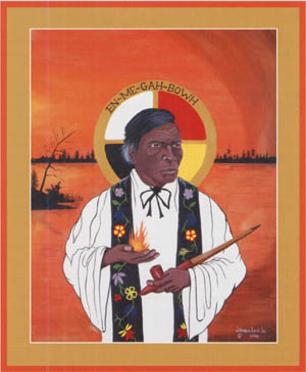
An icon of all the saints (those known and unknown to the Church)
Isaiah 25:6-9
Psalm 24
Revelation 21:1-6a
John 11:32-44
© 2024, The Rev. Seth Olson
This sermon was preached on All Saints' Sunday (November 3, 2024) at the Episcopal Church of the Holy Apostles. Video of the sermon may be found here.
Holy God, Sanctifier of all the saints, let my words be your words and when my words are not your words, let your people be wise enough to know the same. Amen.
Happy All Saints’ Sunday!
Now, when I say “saint” who comes to mind? No, I am not fishing for compliments. Maybe it’s someone like former Archbishop Desmond Tutu who was instrumental in overthrowing the apartheid government of South Africa. And, who along with South Africa's First President Nelson Mandela developed the Truth and Reconciliation Commission to bring healing to a hurting nation. I once met Archbishop Tutu who was maybe 5 feet tall but whose presence was enormous!
On his visit to Sewanee (where I was working at the time) he greeted every student, faculty member, and administrator he met. This was nice and pro forma for most honorary degree recipients, but Archbishop Tutu also intentionally sought out kitchen workers, maintenance men, and the cleaning crew to tell them thank you. He went out of his way to express gratitude for them and to share about the interconnectedness of our lives. I am sure some of those workers who lived in rural Franklin or Grundy County, TN had no clue who that man was, but to a person they were all smiling after he spoke with them.
Desmond Tutu is a Saint. The Church agrees about this. All Saints’ Day though is not for Archbishop Tutu. Well, it’s not JUST for him. All Saints’ Day is different. It’s for ALL the saints. Not just the ones that the WHOLE Church recognizes or remembers. So, if this is the case, what’s it mean to be a saint?
Saint, as a term, has gotten confusing, layered with unnecessary guardrails and guidelines. In the New Testament, the word simply meant a member of the Way of Christ, the nascent Church, which was living in the light of the Resurrection. Every “parishioner” so to speak was a saint.
Nowadays we have mixed up this term. We tend to think it means someone who is “perfect” (by worldly or otherworldly metrics). Truthfully (and more to the point), the root word for saint connects to another familiar Church term “Sanctus,” the hymn of praise that we join the angels, martyrs, apostles, and heavenly hosts in singing every Sunday during Holy Communion. What are the first words of that unending anthem? Holy, holy, holy. What does it mean to be a saint? It means to be... you guessed it... holy, holy, holy. However, if you think that to be holy means to be an antisocial hermit that spends all day praying in a cave, you may have conflated the term pious with holy. To be holy means to be set apart. Sure, hermits are set apart, but that’s not the only way for God to distinguish you. Our Holy God calls us into work fit just for us—that's right, there are missions set out only for you to complete.
Are y’all with me still?
Maybe the best way to understand all this is to indulge in some beautiful theology within one of our Communion hymns for today, “I Sing a Song of the Saints of God” by Lesbia Scott. Some do not like this folksy tune, but the hymn writer created it as a children’s song to teach about the lives of the saints on All Saints’ Day, so taken in that light, what’s not to love?!
It begins, “I sing a song of the saints of God, patient and brave and true, who toiled and fought and lived and died for the Lord they loved and knew.” Then, it subtly hints at some Saints of the Church—a doctor (Luke the Evangelist and Physician), a queen (Elizabeth), a shepherdess on the green (Joan of Arc). All of these folks were saints of the Church. Then, comes something important for us to understand hagiography (the study of saints): “They were all of them saints of God, and I mean, God helping to be one too.” God is helping them to be saints. Hmm?... Interesting, I wonder, does God help us in the same way... hold onto this.
[A brief aside here: Through the stanzas, then other saints are listed. And, the best bit of this hymn may very well be in the second stanza, when “And one was a soldier (Martin of Tours), one was a priest (take your pick), and one was slain by a fierce wild beast (Christopher)”[1] is sometimes switched to sing, “And one was a soldier, one was a beast, and one was slain by a fierce wild priest.” I give you permission, even blessings, to sing this today and into the future! Here endeth the aside.] Alright, so the lyric that may very well turn our understanding of being a saint on its head comes at the very end of stanza three, “For the saints of God are just folk like me, and I mean to be one too.”
See saints aren’t just the Desmond Tutus, Queen Elizabeths, and Joans of Arc of the world. Although maybe we should remember that all these were just folk just like me (and you). Instead, all of us are called to be set apart for God’s work. All of us are to walk Christ’s Way of Love. So, what might this look like? Do we have to greet every person we meet with a smile, be burned at the stake, or get slain by a fierce, wild priest... I mean beast? Maybe, but our Holy Scripture for this day truly give us a better glimpse of how to be one too.
Our lessons give us powerful visions of what it means to be God’s saints, a people set apart. Not in the sense of some unreachable perfection, but as ordinary people called to live anything but ordinary lives. Isaiah speaks of a feast prepared for all peoples, a world where God will wipe away every tear. We are to be compassionate and caring for one another in good times and ill.
John’s Revelatory Dream for the End of Days promises a new heaven and a new earth. We are to be a part of making this world look more like God’s Dream and less like the nightmare it often is to quote Saint Michael Curry now retired Presiding Bishop of Our Church. The Psalm reminds us that “the earth is the Lord’s, and everything in it,” which helps us see that we aren’t in this alone, but participating with God in this holy work. And in John’s Gospel, we see Jesus calling Lazarus from the tomb, bringing life where there was once only death. The saints of the Way of Christ though were the ones who unbound the once-dead Lazarus to restore him into holy community. This is our work as saints too.
Taking into consideration these readings and what we’ve learned about saints, what does it look like for us, in this time and place, to be ones who are set apart for God’s work?
First, consider your closest relationships: family, friends, and this church community. Being saints here means showing up with love, forgiveness, and compassion. It means working toward the common good in our neighborhoods, choosing the hard work of community over isolation. It means holding each other accountable, but also holding each other up in prayer, kindness, and encouragement.
Next, expand wider. In the book of Revelation, John envisions a new heaven and a new earth, one in which God declares, “See, I am making all things new!” To be a saint isn’t just a far-off hope; it’s a present call to action. We are invited to participate in God’s work of renewal now, to help bring about that new creation. And that extends into how we engage the public sphere. We can’t separate our faith from the rest of our lives—not from our workplaces, not from our schools, and certainly not from our responsibilities as citizens.
This week, many of us will exercise one of those responsibilities as we go to the polls to vote. As we prepare to do so, may we remember that our call to be saints includes this responsibility, too. Saints aren’t called to retreat from the world but to engage it, to bring the values of God’s dream into every part of it.
In our Gospel reading today, Jesus stands at the tomb of Lazarus and calls out, “Unbind him, and let him go.” This is Jesus’ work—to bring freedom, healing, and wholeness. And as saints, this is our work too: to bring life where there is death, to unbind where there is oppression, to heal where there is pain. This work includes every choice we make in our lives and every vote we cast.
We will not agree on every political issue. We will not all vote for the same candidates. And, friends that is okay, for I believe we can all agree on this: as saints, we are called to align ourselves with values and virtues that reflect God’s dream for this world. Values of compassion, justice, humility, and love. Values that lift up the vulnerable, care for God’s Creation, and protect the dignity of every human being.
It is no small thing to be called saints. And it’s not easy. It requires courage, sacrifice, and discernment. It means sometimes having difficult conversations, choosing the path that is harder, being willing to make decisions that go against the grain of our own interests for the sake of loving God and loving neighbor. And yes, sometimes it means making choices that challenge the status quo and disrupt patterns that keep us bound in cycles of injustice and suffering.
As saints, we don’t just live for ourselves. We live for others. We live for God’s vision, for the world that is possible when people walk the Way of Love. We live for that day when we will all sit down together at God’s great feast, every tear wiped away, every division healed, and every injustice made right.
So, this week and always, let us go forth with the courage of saints. Let us live and act as people set apart—not for our own sake, but for the sake of the world God loves. And let us remember that we do not walk this path alone. We are surrounded by a great cloud of witnesses—saints past and present; saints in this room and beyond—cheering us onward, guiding us forward. For the saints of God are just folk like you, and I hope you mean to be one too! Amen.
[1]Pam McAllister, “What hymn celebrates lives of courage and generosity?” on Ask Her About Hymns Blog [https://askherabouthymn.com/what-hymn-celebrates-lives-of-courage-and-generosity/, written: October 27, 2016; accessed: November 1, 2024].







